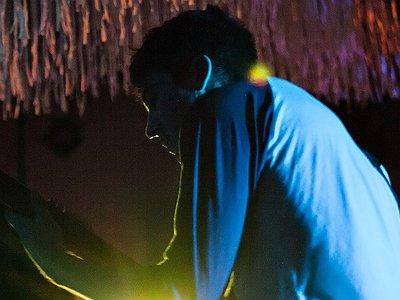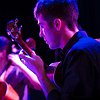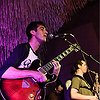Part 3
With more and more musicians creating than ever and more and more of these creations being released, what does this mean for you as an artist in terms of originality? What are some of the areas where you currently see the greatest potential for originality and who are some of the artists and communities that you find inspiring in this regard?
This is a hard one. I think that art that tries to be unique for the sake of being unique often loses its heart in the process. What’s great is that musicians (myself absolutely included) tend to be eccentrics. If you really mean it (or are even just having a lot of fun making something), that tends to bring your individuality through without actively forcing it.
I think that there’s still a lot of room to explore in presentation. The electronic musician/composer Dan Deacon’s shows are more like an ecstatic community events or Sufi whirling than they are “concerts.” When I lived in LA, I used to watch a duo called Lucky Dragons perform. There’d be 20 of us sitting in a circle using CDs to reflect lights on the walls and playing with a hookah-looking apparatus that allowed us to actually change the sounds of the music as it was happening. “Classical” or “academic” music is at a crucial turning point – I don’t think that people are as interested in the artist-audience duality any more.
How would you define the term “interpretation”? How important is it for you to closely work together with the artists performing your work?
It depends so much on the music. I tend to write for people I know and I often think that they’ll come up with more interesting ideas than I would on their respective instruments. Sometimes it’s way more effective to write “freak out” on a piece of paper than it is to come up with some insane tangle of notes that, in translation, sounds nothing like “freaking out.”
It’s very important for me to work with the performers. And it’s often the most illuminating aspect of the process: it’s when I’m made aware of mistakes I’ve made, offered [often better] alternatives and coached by the musicians on how to best get the sounds out of my head and under their fingers.
The effect of a piece doesn't merely depend on the performance of the musicians, but also on the place it is performed at. How do you see the relationship between location and sound? In how far do you feel the current system of concert halls is still the right one for your music – or for contemporary music in general?
I touched on this a few questions ago, but I think that the concert hall model isn’t the best for a lot of contemporary music. Increasingly, you have these artists like Tristan Perich (or the aforementioned Lucky Dragons) whose music sits at the intersection of installation and traditional performance. Or composers like John Luther Adams who use the environment as an integral aspect of the composed music.
From a less high-brow point of view, it’s simply more fun to sip on beer and dance than it is to sit in a dark concert hall with no leg room for 3 hours.
What's your view on the role and function of music as well as the (e.g. political/social/creative) tasks of composers today - and how do you try to meet these goals in your work?
I have yet to write a specifically political piece of music, but obviously, music and politics have always been very intertwined. I’m not sure that I feel that today’s composers have a unique challenge in that way, but it’s certainly a responsibility.
I do feel some significant changes in the air. One is the increased visibility of women composers. Last year, I was part of a radio project highlighting female composers today and the existing statistics of commissions of female works by large orchestras, by women on composition faculty and of women as major prize winners are all mind-bogglingly low.
And how many non-white orchestral or chamber music composers can you name?
I think that a big advantage in working in art – visual, literary, musical – is that you don’t have to be subtle. And, if it’s something you believe in, you shouldn’t be.
Do you have a musical vision that you haven't been able to realise for technical or financial reasons – or an idea of what music itself could be beyond its current form?
For me, it would simply be the ability to finance a large (7-10 person) ensemble to record and perform my music live. I enjoy the freedom of being a solo artist, but the spirit of collaboration and community is absolutely essential to my vision of music and it’s a spirit that I’m not tapping at the moment. At least in New York City, there are a lot of people and a lot of scenes, but few of them really feel open. It’d be nice to have enough funding to really create that without having the pressure of being pushed out by some big investor.
If you enjoyed this interview with Hannis Brown, you can find out more by visiting his website or his bandcamp page for more music and further information.







